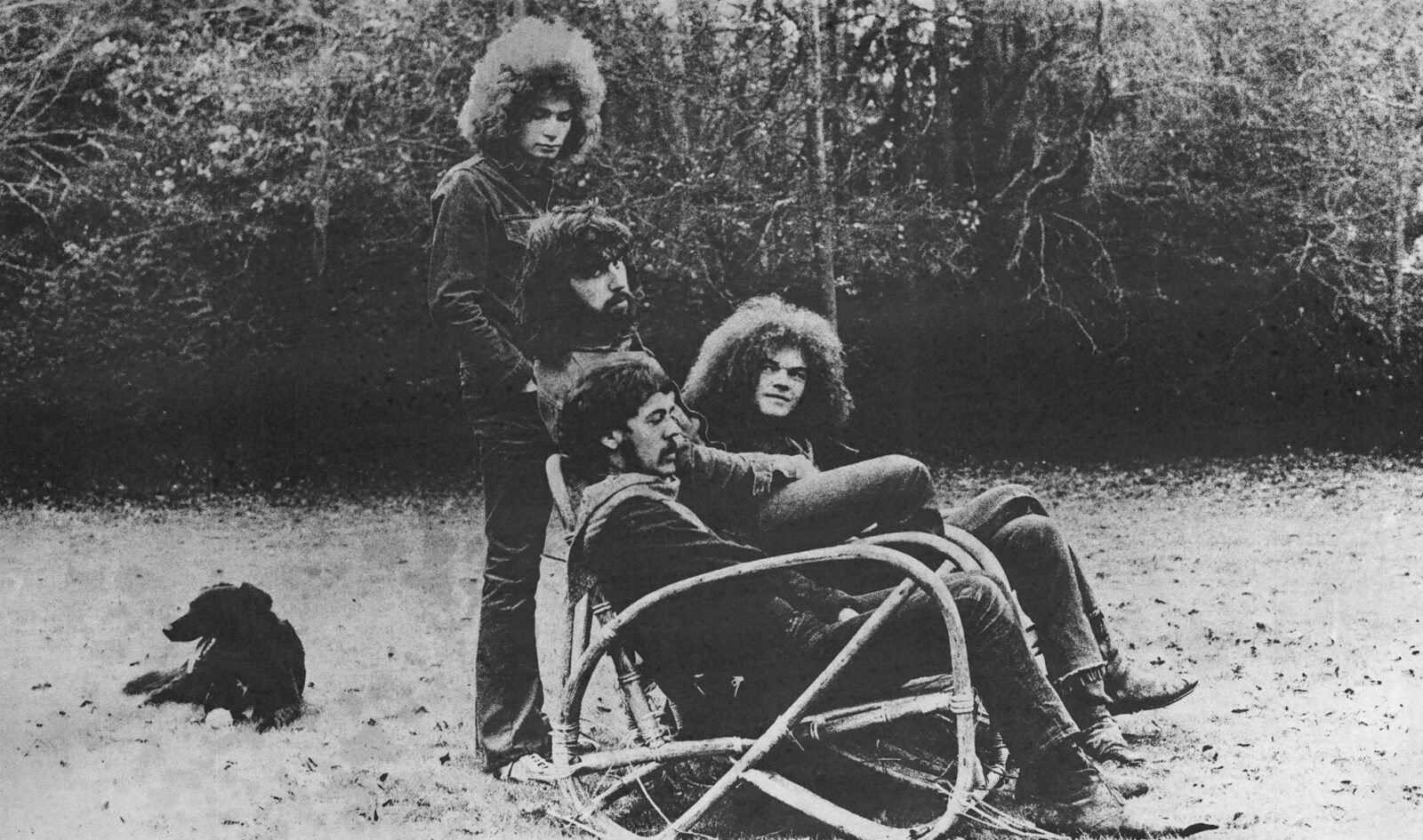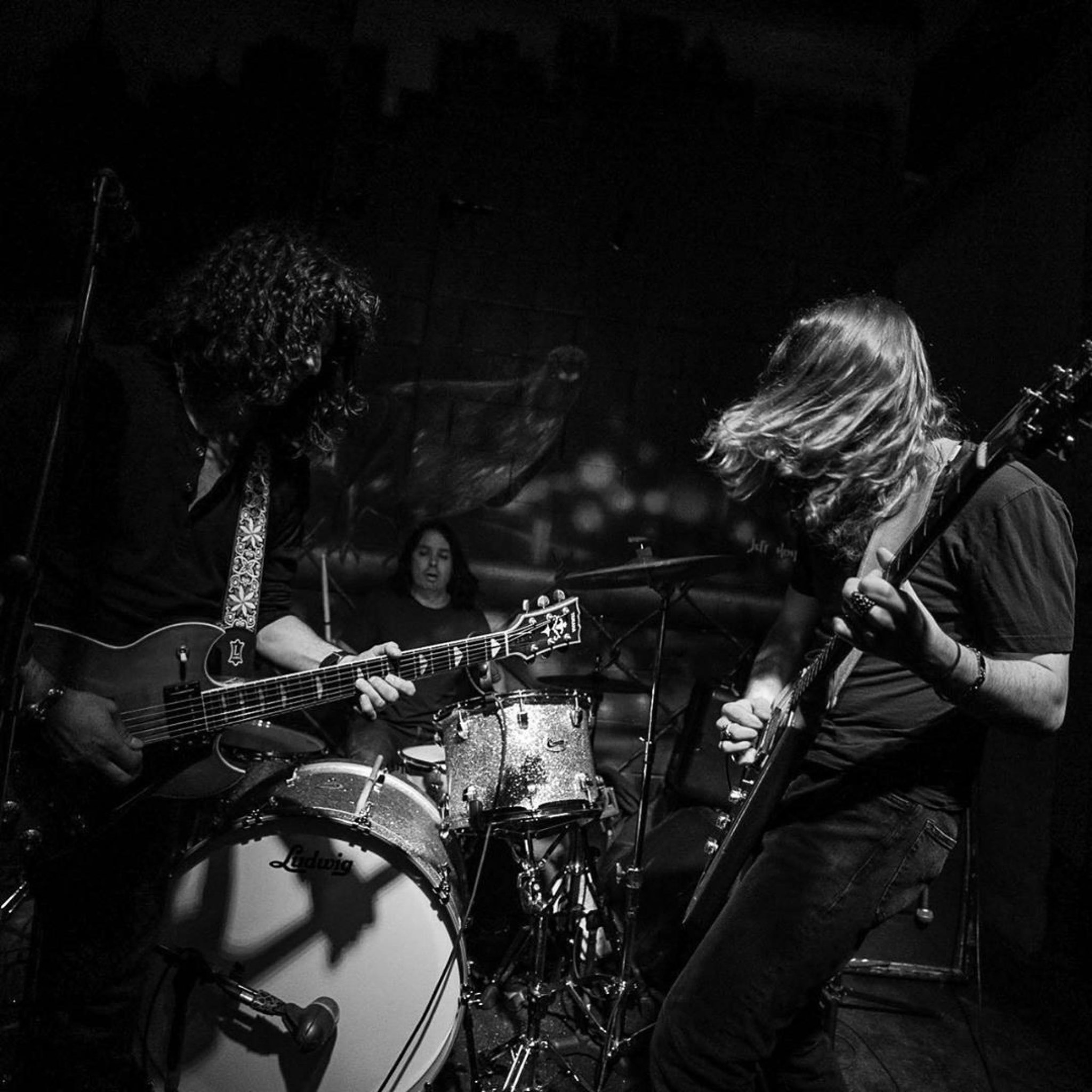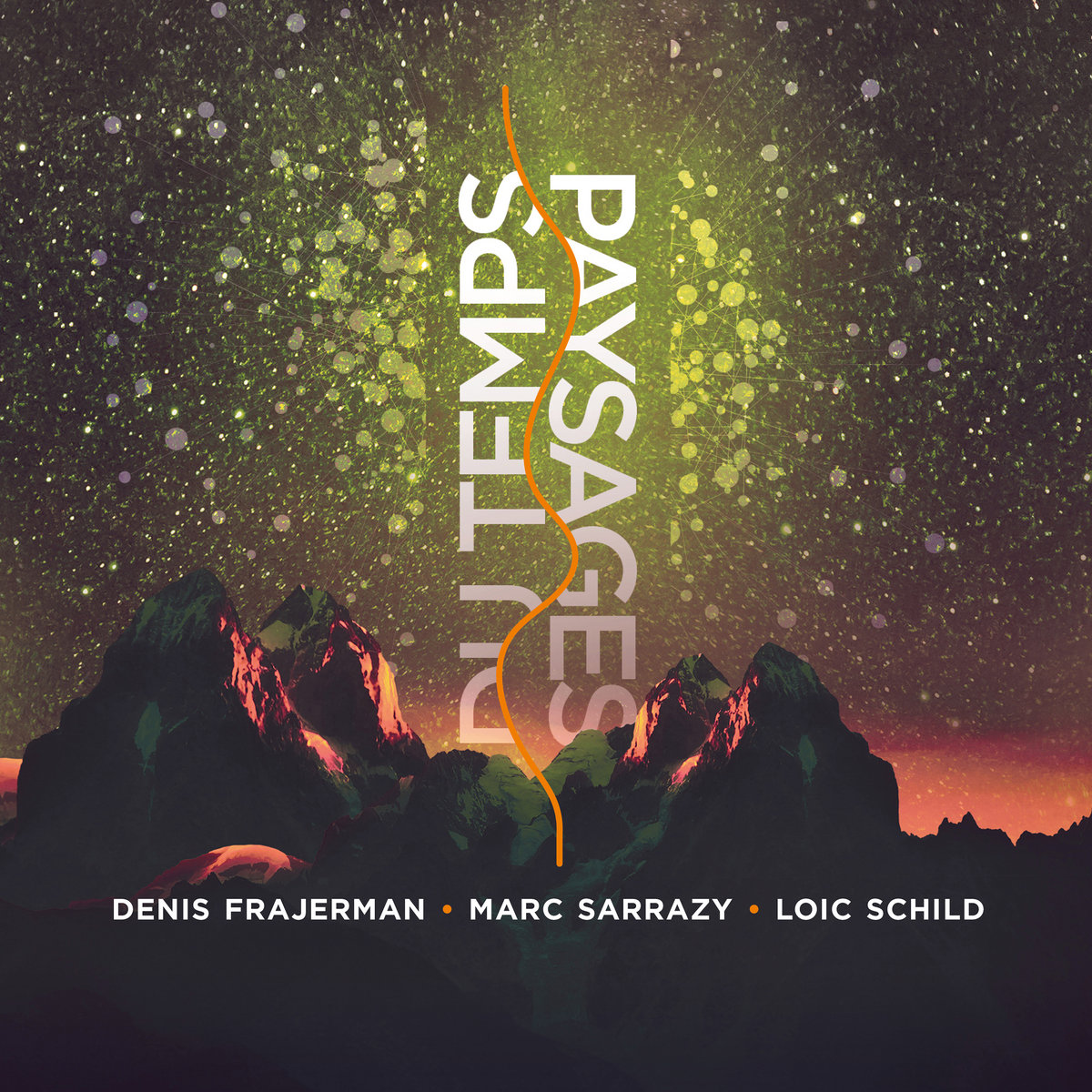Help Yourself | Interview | Paul Burton
Help Yourself formed in London in 1970, originally as a backing band for singer-songwriter Malcolm Morley, who had been signed as a solo act by Famepushers. The band released several albums in a span of a few years.
The second album ‘Strange Affair’ was recorded at Rockfield Studios, initially with Richard Treece still on bass, and adding his guitar parts later, until Paul Burton, their then road manager and former Sam Apple Pie roadie, joined on bass, to complete the album.
Would you like to talk a bit about your background? Where and when did you grow up? Was music a big part of your family life?
Paul Burton: I was born in 1948 and grew up in East London. I was the third child of five, and the first boy, a normal sized family for that time. The war had not long ended and rationing was still in place for many food items including sweets. It didn’t end until 1954 when I was six-years-old. Strangely, for a child that didn’t have sweets, I still developed a sweet tooth which has stayed with me all my life, or maybe it was because I was deprived of them that I crave sweet things now!
My mother was very musical and played piano and sang, firstly in music pubs, and then in West End clubs. There was a big jazz scene in the pubs in London and she sang and played many of the old standards of the 1940s and ‘50s along with the hit songs of the time. I used to lay in bed on Sunday mornings and listen to her practising downstairs. She was quite highly thought of at the time. She didn’t read music very well but had a good ear and could pick up songs by just listening to the radio. She did buy sheet music too so must have been able to read a bit. I realise that my maternal side of the family were of a musical bent as my cousin also played bass in the late fifties and early sixties, firstly with the Laurie J Combo – who had a number of records released in the early 60s – and then went on to tour Europe with the Walker Brothers. My youngest brother Peter is a good keyboard player. He now lives in South Africa, but he toured the world in an Abba tribute band.
When did you begin playing music?
My parents bought an acoustic guitar when I was about nine, which I had to share with my younger brother. Thankfully he wasn’t that interested at the time, being only seven-years-old, so I got to play it most of the time. I bought the proverbial Bert Weedon Teach Yourself Guitar book and practised my chords for hours. I eventually mastered enough to play three chord songs. A guy who lived in the flat above us taught me to play twelve bar blues and songs like ‘Hang Down Your Head Tom Dooley’ by The Kingston Trio, and ‘Memphis’ by Johnny Rivers. I listened to Eddie Cochran, Buddy Holly, Elvis Presley and other radio hits of the late fifties.
As I got beyond the three chord competence level, my mother showed me where the chords were notated on the sheet music she used to buy so I could follow them on guitar. This pushed me to learn all these new chords but I needed a bit more patience as I gave up if it was a difficult fingering. Later on she taught me how to transpose songs to another key, which I thought was very clever.
Around this time we moved out of East London to Essex so I had to change schools and make new friends. Music got shoved aside until I was about 15 and friends started up my interest again. My brother and I saved some money and bought a second-hand Burns Split-Sound electric guitar which was red and black with loads of knobs and switches. This was a big jump from the old acoustic we had, and friends would come round and we’d practice being pop stars. I also discovered girls, who seemed frankly, much more interesting. It was now the early 60s and I was going to a local youth club, listening to Top of the Pops and Ready Steady Go, my music tastes were quite eclectic, I loved The Beatles, The Rolling Stones and The Who, but I also liked Tamla Motown and R&B.
When did you decide that you wanted to start writing and performing your own music? What brought that about for you?
I’ve never really written my own songs apart from specific contributions to those performed by Help Yourself. I was far too unsure of myself musically to attempt things of my own, apart from ‘Calapso’ on ‘Beware the Shadow’. If you listen to that, you’ll understand why!
Were you part of any other bands before Help Yourself? Any recordings or releases by them?
No, they were the first band I played in. I never had any real ambitions to be in a band, or play music for anything other than my own entertainment.
You were working as a roadie for Sam Apple Pie. How did that come about?
When I left school, I worked as an apprentice motor mechanic and then as a car salesman. I had a company car so I was very popular with my friends. I met a nice girl and settled into a very predictable lifestyle, planning to get married and everything. Suddenly, I was twenty-years-old, took a long hard look at my life and decided it wasn’t right. I started to mix with some people who were on the edge of the music scene, going to a few gigs and seeing some bands at local venues like the Cooks Ferry Inn and the Red Lion in Leytonstone. This was around late ‘68 when pubs had become a very popular venue for music.
One of these bands – Sam Apple Pie – was local to me, and their guitarist Mick Smith, knew my younger brother. I also found out their slide guitarist Andy Johnson lived just down the road from me. In chatting they told me they had their own Blues Club called the Bottle Neck above a pub in nearby Stratford, and played there most weekends. They invited me to come down one night. It was a real eye opener, here’s me, a nice straight young man in this darkened room with a bunch of long haired hippies, the smell of joss sticks and dope, and a weird light show with strobe lights and stuff. It was mind blowing. I couldn’t get enough.
It turned out that they needed someone to hump their equipment about and drive to gigs and things – I volunteered on the spot. I gave up my girlfriend and my job and “dropped out” as they used to say. My days now consisted of walking down to Andy’s house, having breakfast, sitting around smoking and then probably driving down to Walthamstow High St. where Mick Smith worked in a psychedelic men’s clothes shop. I bought some very hip clothes and started growing my hair. I also started experimenting with drugs, initially just cannabis. We would then end up round the drummer, Dave Charles’s house getting stoned and listening to music before falling asleep on his lounge floor to be woken up in the morning by his mum! Dave introduced me to some great music, Paul Butterfield, Dave Brubeck, Pink Floyd, John Mayall, Spirit, Love et cetera.
We were gigging around the pubs, colleges and universities having signed to NEMS, the music agency originally formed by Brian Epstein of Beatles fame. Sam Apple Pie were a great little blues band and were in high demand. In early ‘69 they went into Decca’s studio in West Hampstead to record an album, which was released later that year. I can remember doing a daft publicity stunt for the release which involved turning up at John Peel’s flat in Marylebone and presenting him with a giant Apple pie. He took it very well and it got the band a few mentions on his radio show.
I also recall that the band was contracted to appear in a film called Tomorrow, being filmed at The Roundhouse in Chalk Farm, London, starring Olivia Newton-John. It was a sci-fi film and the band had to perform in a so-called night club that the stars were visiting. The night before we’d been playing in Sunderland and had driven down overnight to be on set by nine thirty the next morning. We spent three days wandering around the set stoned out of our minds, and finally recorded about two minutes of music. In fact, I think even that was cut from the final film.
On another occasion the band played at the Royal Naval College in Dartmouth, Devon. Again, we all spent a lot of time wandering around smashed, admiring the pretty girls attending this big annual ball. I don’t think the navy guys were too impressed with us though! During our stoned wanderings a couple of us went through these huge double doors to be faced with a long table decked out with candelabras and flowers with all the uniformed officers and their partners sat down scoffing food and drinking champagne. We were gobsmacked! It didn’t take long for a couple of uniformed waiters to hustle us back out of the doors. How the other half live eh?
In October 1969 they played the Amougies Festival, in Belgium, where Frank Zappa jammed with them. Were you there?
No, I’d left the band by then to work with Help Yourself. However, in early 1970 they asked me to help out with a tour of Holland, Belgium and Germany supporting Spencer Davis. He was basically doing an acoustic set with another guitarist, and then Sam Apple Pie would join him on stage to do some blues numbers. I remember being very impressed that Spencer spoke German!
The band also appeared at Glastonbury Festival in 1970!
Again, I’d moved on by then, but the following year I was with Help Yourself when they played Glastonbury. In fact it wasn’t called the Glastonbury Festival until 1971. Before then it was the Pilton Music Festival.
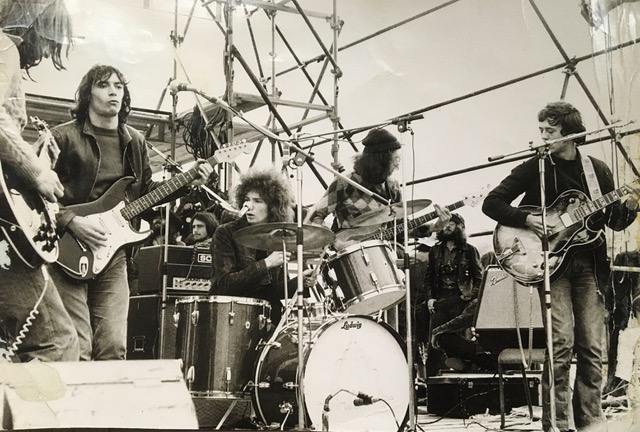
You became a road manager for Help Yourself. How did that come about?
It’s quite a long story. Around late summer of ‘69, Dave Charles left Sam Apple Pie. I’ve heard he was fired but I can’t honestly remember the circumstances. Dave and I were pretty good friends by then, both of us were probably more “straight” than the others, he was into electronics and cars, so we clicked and were hanging around together a bit. He’d known Malcolm Morley since they were both kids, and one day we were chatting and he mentioned that Malcolm was involved with a film production company who were also involved in music production. Malcolm had written a bunch of songs and the company – Famepushers – had suggested he go and record the songs, so he was looking for musicians to back him. Dave was going down to talk to him with a view to playing drums. I said I’d go along.
We met Malcolm, who was living in a basement flat in a house in Granville Road Walthamstow, and chatted and he played us some of his songs. They were quite folksy tunes but really good. Malcolm then explained that he got involved with Famepushers through John Eichler who was the production manager for a cosmetics company in Barnes, South West London, where he had got a temporary job. John was really into film making and he had friends who were working on a film about Bridge – the card game. It starred amongst others Omar Sharif, the well known film star. Anyway, John was living in Barnes with Dave Robinson who had been a road manager for Jimi Hendrix, and he was currently managing an Irish band called Eire Apparent and another named Brinsley Schwarz. He had persuaded the people at Famepushers to move into music, ostensibly to produce music for the film, but this had expanded into band management and record production. He was talking with United Artists about signing the Brinsleys and Eire Apparent and of course Malcolm. The problem was Malcolm didn’t have a band, and Dave Robinson thought it would be better if he got a group together to support him.
As luck would have it, working with John and Malcolm at the cosmetics factory was another musician, guitarist Richard Treece. Apparently, John only employed musicians or hippies! So, that meant with Dave Charles, there were now three in the band and I kind of offered my services as a road manager looking after their equipment. Richard came from Brigg in Humberside, so just before Christmas 1969 he came down and we all met up at Malcolm’s flat and talked about what we were going to do.
At some point we drove up to Famepushers’ office which was located in Park Street, just by Regents Park at the continuation of Baker Street, for a meeting with John and Dave Robinson and Eddie Moulton who was the MD. There has been a lot written about Famepushers, the famous Brinsley Schwarz/Fillmore East Hype and the infamous Eddie Moulton elsewhere. Makes interesting reading if you Google it! The name Help Yourself was suggested for the band and accepted by everyone, I can’t remember who suggested it. Anyway, the creation of the group was now formalised and I was accepted as the official road manager of a band that had no bass player and no equipment apart from Dave Charles’s drums and Richard’s Vox AC 30 amplifier and Stratocaster guitar! We had a car, which was Dave Charles’s, but no other transport. And we were due to go into a studio to start recording Malcolm’s songs!
There seemed to be a lot of money around and Dave Robinson told me to go out and buy a suitable second-hand Transit bus for the “group”. Now all we needed was somewhere to live, a bass player and some equipment. The accommodation issue was resolved when the flat above Malcolm’s became available. The missing bass player problem was resolved very soon after.
We were on our way to Portobello Road to the office of Friends magazine where Dave Robinson had a desk and phone he used – probably to draw some wages or something – and we stopped at a cafe to get some lunch. Standing outside I heard a voice shouting hello from above. I looked up and there was Ken Whaley hanging out of the window. He came down and chatted for a while and then left whilst we went into the cafe to eat. Malcolm I think it was, asked me how did I know Ken? “Oh! He’s a bass player in a band called Growth”, I replied. They were a band I knew from my time with Sam Apple Pie. “Oh!”, said Malcolm, then after a long pause, “Aren’t we looking for a bass player?”. We rushed out of the door and rang the bell to Ken’s flat and were invited in. Having explained the situation to Ken we offered him the gig and he jumped at the opportunity. Now we had a full band, a road manager and a Transit bus. “We just need some equipment and we’re away”, I said.
After Christmas we all drove up to Brigg to move Richard and his belongings down to London and he and I moved into the flat above Malcolm’s. For a couple of months we all congregated in Malcolm’s basement every day and the boys rehearsed the songs that would be going on the first album. Then it was long nights spent in Olympic Studios in Barnes with the assistance and guiding hand of Anton Mathews, overseen by Dave Robinson, to finally complete the ‘Help Yourself’ album.
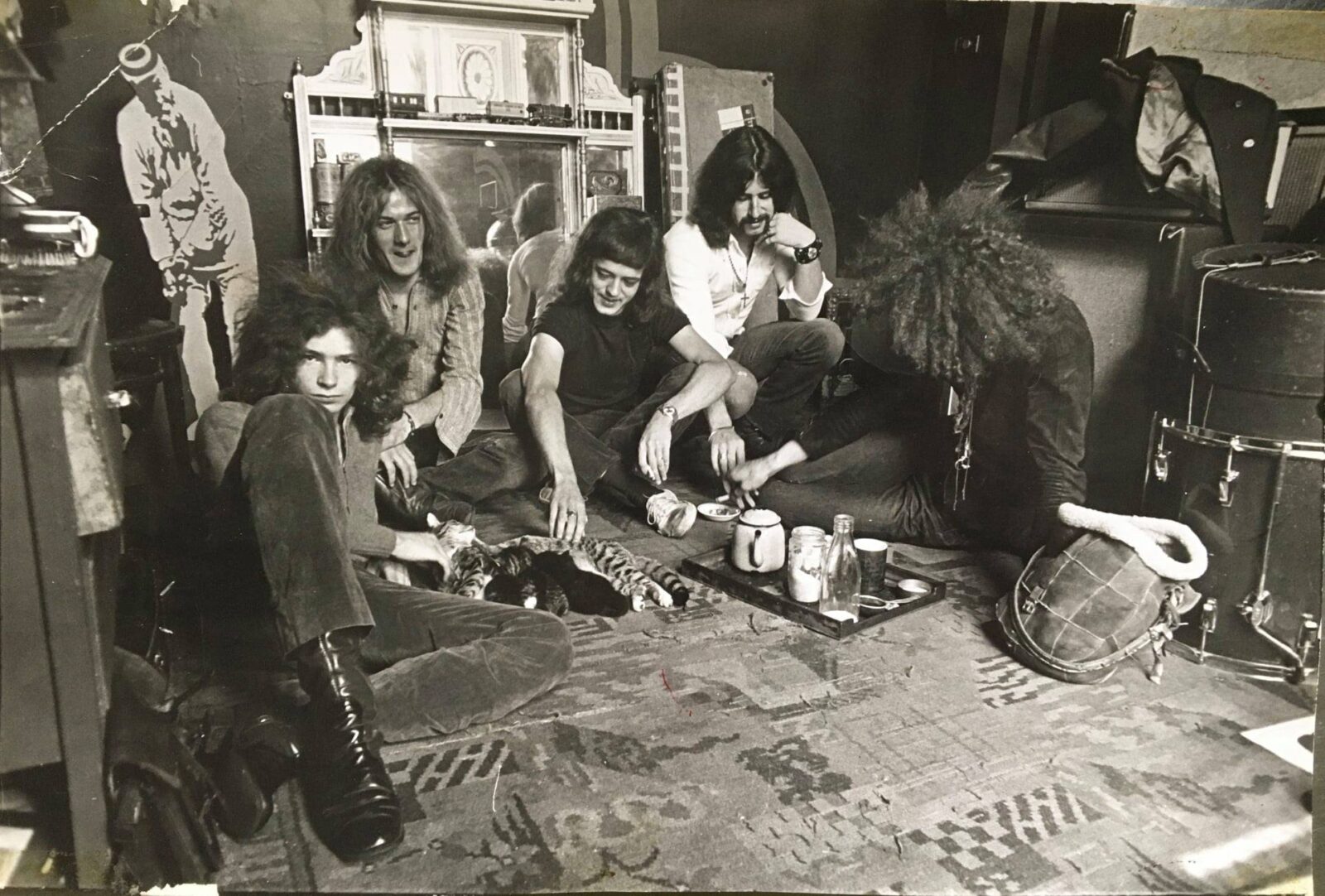
What kind of gear did you have in the band?
As I’ve already explained, we had very little gear, not enough really to even go into a recording studio. Richard was using his old Dansette record player as an amplifier. He’d wired in a guitar lead somehow and it gave a great sound, really sustained and fuzzy. Back to Dave Robinson and the money tree. “Ok, I’ve done this deal with Dallas Arbiter (The main UK importer of Fender equipment)”, he said. “Go to their warehouse in Essex next Monday and get the band the stuff it needs”. I was gobsmacked! The finest equipment available and we just had to go and pick out what we wanted, amazing. We made a list of everything we needed and drove out in the van to collect it. We were like kids in a sweet shop! “Erm we’ll take two Fender Twin Reverbs, a Fender Bassman, oh! And that blonde Telecaster, ooh that’s a nice looking black Les Paul we’ll take that and we need acoustic guitars. Yes, those two Yamahas will do nicely, some microphones and stands, a Fender Rhodes electric piano, all the connecting leads and a PA system? Yes the Hi-Watt will do and a mixer for the microphones”. “Is that it?” they said. “That’ll do for now I answered”. I quickly packed everything in the van and shot off before someone asked how we were going to pay, or told us to put it all back.
What were the circumstances that led you to join the band on bass?
As you can gather from above, I was actually with the band from almost day one. The first album was in the bag and now United Artists wanted us to start doing gigs to promote it. We were signed to NEMS and they started to get us bookings. It wasn’t practical to rush around picking everyone up from their homes and then driving to gigs, so it was decided that we should move into a rented house together. Our stable mates Brinsley Schwarz had set a precedent by renting a large house in Northwood, so Dave Robinson got his then girlfriend Dotti Burn-Forti to find us a suitable house. She found us Headley Grange on the border of Surrey and Hampshire which was just perfect. It had been used by Led Zeppelin most recently to record their second album using The Rolling Stones mobile studio, so the owners were used to long haired musicians. Fleetwood Mac lived on the other side of Headley village too. It seemed to be a popular area for bands!
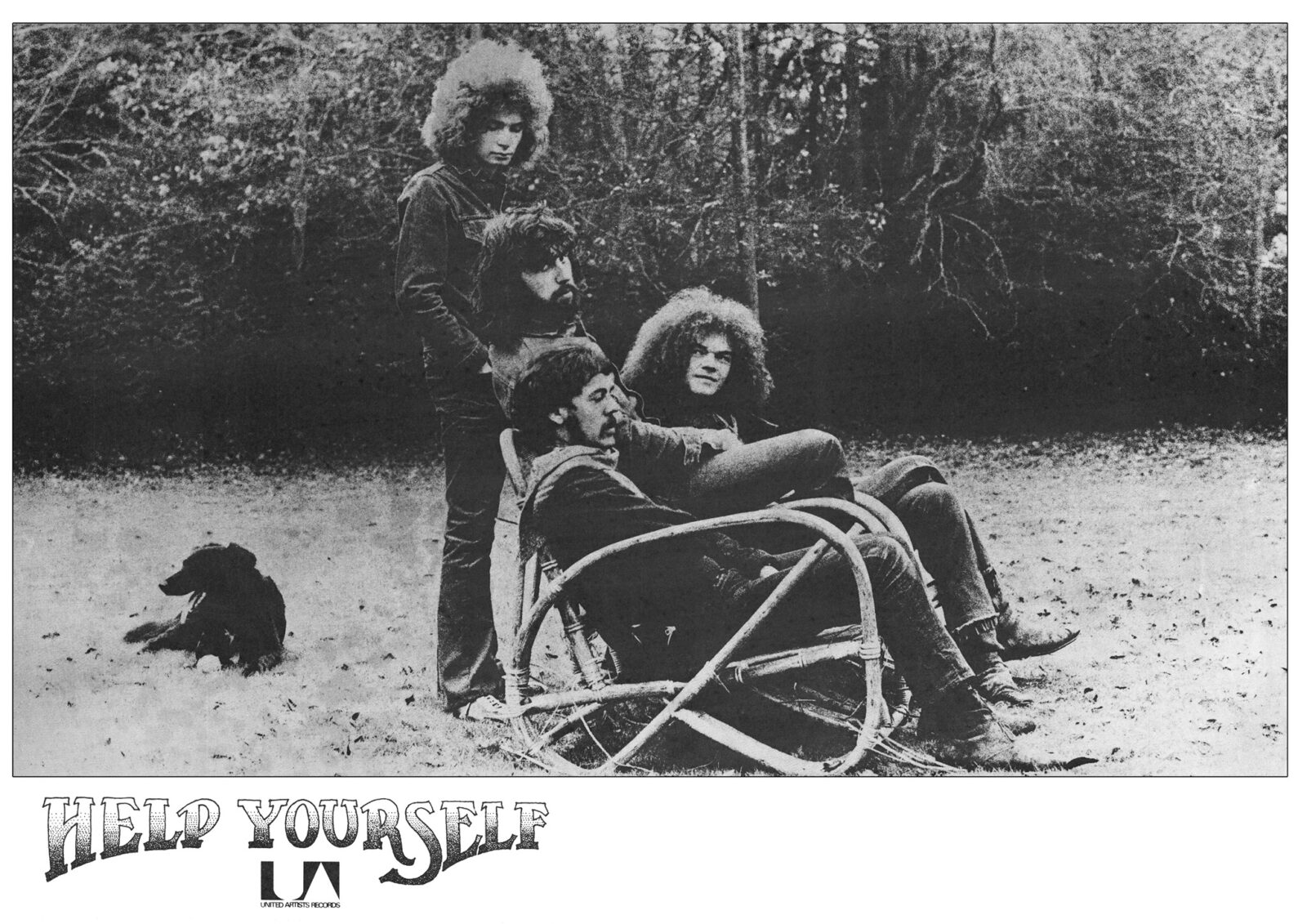
So, one day Richard, Malcolm and I packed up our possessions and then drove to Headley. We found out later that a couple of hours after we left, the drug squad arrived to see us but of course found nobody home. I understand their sniffer dogs went berserk though! Ken and Dave joined us later that day and John and Sue Eichler moved in too. We loved Headley Grange, it was huge. We all grabbed the rooms we wanted and settled in with assorted girlfriends, wives et cetera. The dining room became our rehearsal studio so I set up all this lovely new Fender equipment, and Dave’s drums, and the self-styled Hampshire Border Raiders were home.
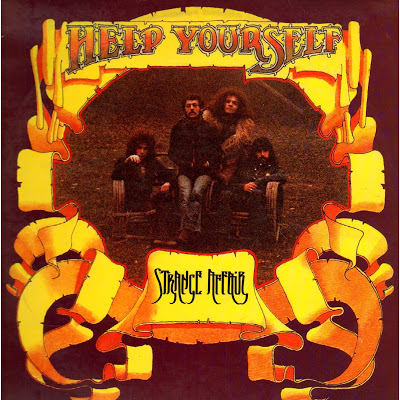
It was such a super environment, the band could practice whenever they felt like it, I used to often sit in and jam with Richard, Malcolm or Dave. I just played whatever instrument was free, guitar, bass, drums. It was improving my musical ability tremendously. Obviously, a lot of illegal substances were consumed, at times it seemed like one big never-ending party.
However, there seemed to be an atmosphere developing between Ken and Dave Robinson. I don’t know what it was about. Dave was a get up and get at it sort of guy and Ken was very laid back and didn’t talk a lot. I think that made Dave feel Ken wasn’t contributing and put pressure on Malcolm and John Eichler to get rid of him. Unfortunately, that’s what ensued. Robinson had this idea to get Ernie Graham involved. Ernie had been the singer and rhythm guitarist with Eire Apparent and he was going solo but with a guitarist called Jonathan Glemser supporting him. Robinson suggested that the two of them be grafted onto Help Yourself. This meant we had too many guitarists so Richard was delegated to play bass, which I thought was a terrible waste of his talents.
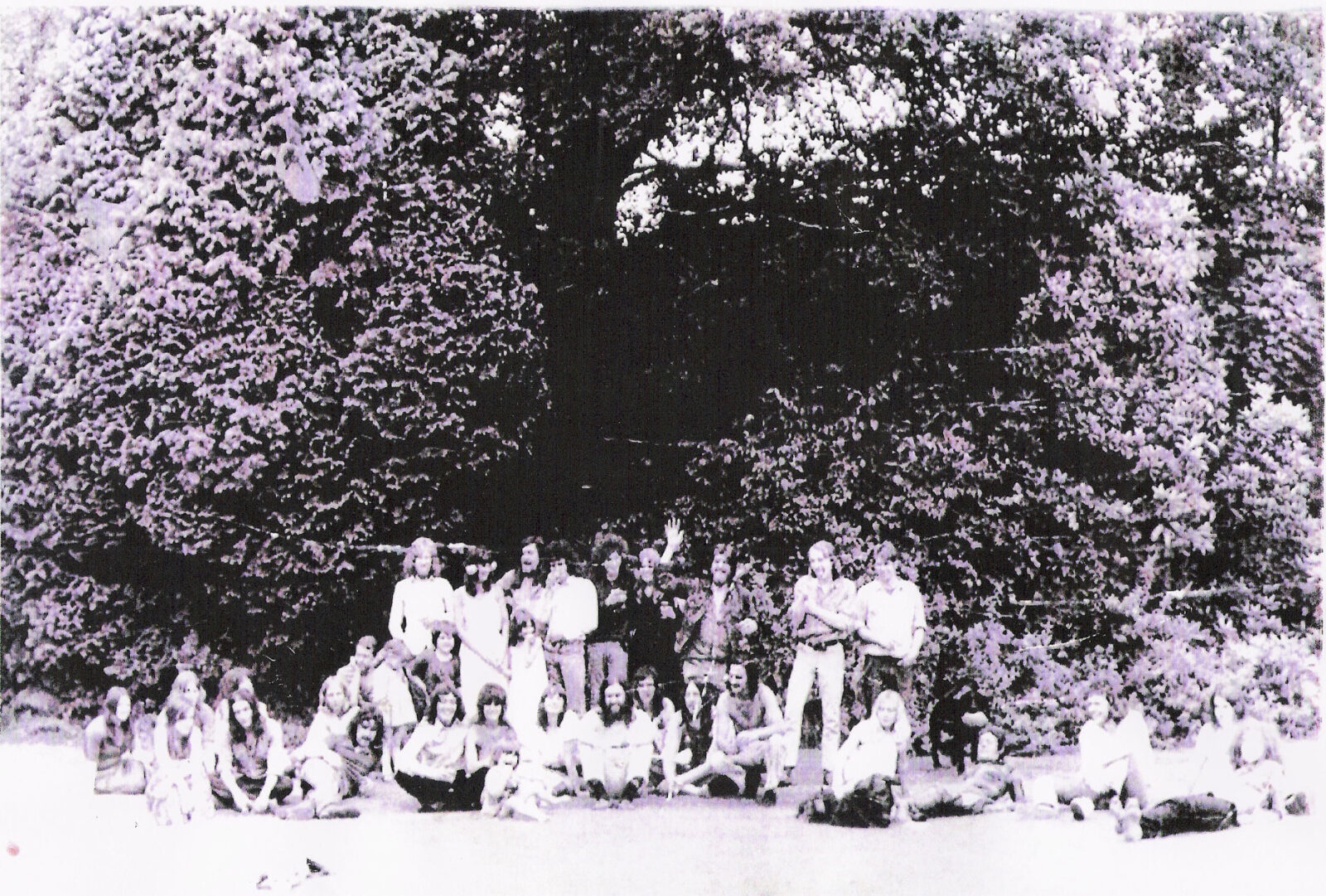
Nevertheless, the band was putting together material for their second album, ‘Strange Affair’ and so they slotted in some of Ernie’s songs and proceeded to Rockfield Studios in Wales to start recording. About halfway through, it became evident that despite some good gigs, even playing Glastonbury, in the long term it just wasn’t going to work, so Ernie and Jonathan left, now we had no bass player, and the band was only a three piece. Initially I think as a sort of joke, someone said, “well Paul can play bass and stuff, why doesn’t he just join the band and we’ll get another roadie?”. I was excited and thought, great idea, I know the songs off by heart, how hard can it be? I was later to find out how hard it was when I played my first gig at Bath University supporting Redbone. I froze solid on stage! I did manage to get through the rest of the set though and realised I actually enjoyed it immensely. It was at this time that Sean Tyler showed up at Headley. We’d bumped into him at United Artist’s offices. He was quite mad in a friendly way and tried to convince us he’d been playing with Gino Washington and his Ram Jam band. Well, we needed a new road manager, so Sean volunteered. He’d never done anything like it before, but in fairness nor had I. He wrote the most amazing fantasy stories and was obsessed with America. It was his influence that resulted in the song ‘The All Electric Fur Trapper’, with Malcolm and him writing the words and the rest of us creating the song.
We finished off the album at Olympic studios and I remember we were running through ‘All Electric Fur Trapper’ and I was playing guitar, just jamming really looking for ideas to develop the song. Dave and Richard were in the studio with me, I think Malcolm was in the control room. My amplifier was cordoned off by chest high sound proof baffle boards, which help with separation of the sound, when I became aware of a person leaning on one of the boards slightly behind me. Thinking it was Sean or one of the engineers, I ignored them and carried on fiddling about. We finally stopped playing and I heard a voice behind me say, “Far out, nice guitar man”. Turning round I came face to face with a very stoned Stephen Stills of Crosby, Stills, Nash fame. I was too stunned to say anything, just mumbled, “Oh, thanks man”, and he then wandered back out of the studio door.
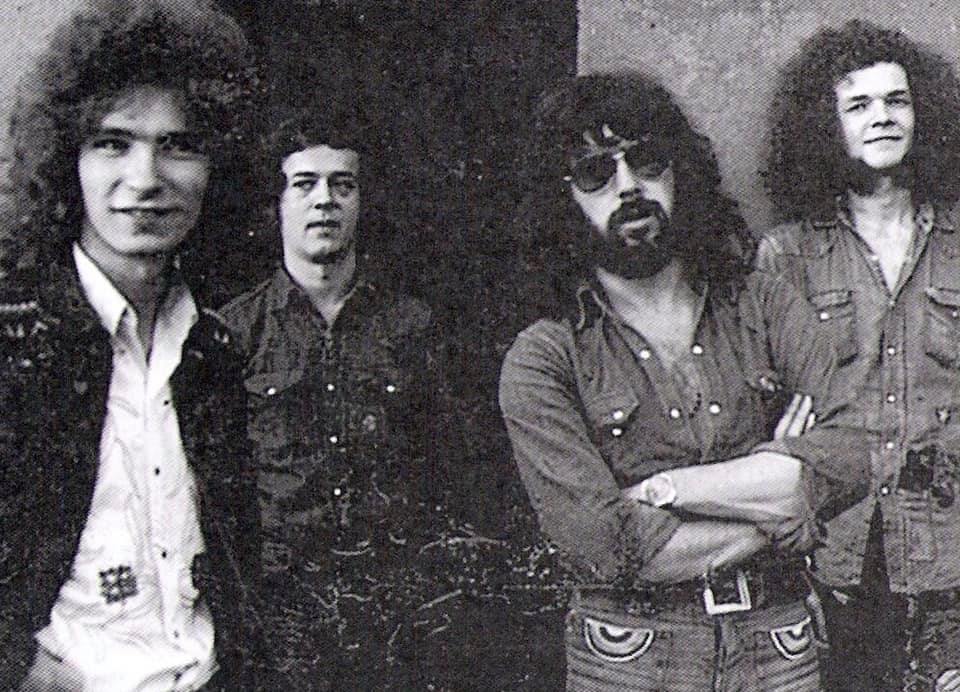
With the new lineup of Morley, Treece, Charles you played your first Peel Session.
The Peel sessions were recorded at the BBC Maida Vale studios. The studio was not exactly technologically advanced and we set up like we would for a normal gig. The session was produced by John Waters I think, who produced most of John Peel’s things. He was a lovely laid back guy and he just let us sort of rehearse our numbers and then came into the studio and chatted to us for a while. We did most of the things in one take without overdubs and stuff, although I think Malcolm did play both piano and guitar so we must have overdubbed some things. To be honest, I don’t remember which tracks we recorded. I remember the session we did for Bob Harris’s show more vividly actually.
What’s the story behind working on ‘Beware The Shadow’?
‘Beware the Shadow’ came around at the time of one of Malcolm’s, by now more frequent, black depressions, hence The Shadow! Most of the songs came together in the rehearsal room at Headley while he was doing ok, and then the more spaced out stuff followed with Sean Tyler’s lyrics inspiring ‘American Mother’. That and ‘Reaffirmation’ are my favourite tracks although I didn’t think of them at the time. Recently, with the release of the new 6 CD box set, ‘Passing Through’, I’ve listened to all of these songs again and these two really stand the test of time in my opinion. They also reflect the band at its most creative and adventurous. Both deserve a listen through headphones in a darkened room.
“The whole song is like a fantasy journey on a steam train”
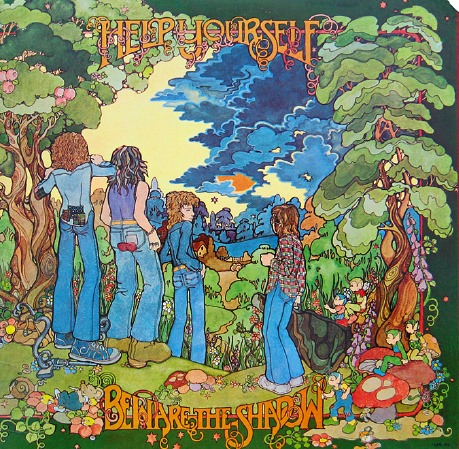
‘Reaffirmation’ was my only real contribution to the band. I came up with the opening chords after playing around with the Fender Telecaster set on full reverb and echo. I’d been playing this minor 7th chord sequence in the rehearsal room at Headley and Malcolm came in and picked up my bass and started playing these very Grateful Dead type bass lines that Phil Lesh would have been proud of, then Richard must have heard us playing and popped in and started playing some spaced out guitar with Dave joining in underneath filling in the gaps. It was a jam really but then we started to look for ways it could develop. Malcolm added some bass lines that took it into something different and then I came back with a section of jazzy funk chords. Malcolm finally came up with some lyrics which fitted perfectly, and we had a song. Live, we used to really stretch out on this, and when I listen to it now I still get shivers down my spine when it finally comes back to a reprise of the opening section and slows to a halt. The whole song is like a fantasy journey on a steam train.
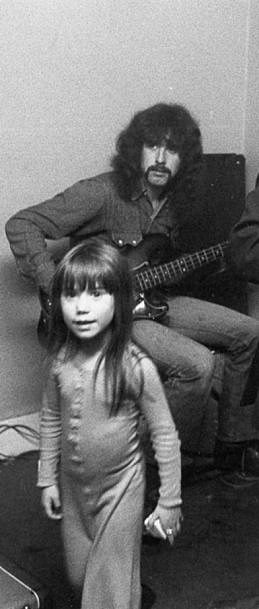
You became recognized by the US audience, but never played there. What was the reason?
I don’t think we ever discussed going to America. Too many things were happening – changes in the band, recording et cetera. At the time we weren’t particularly popular in the US, it was only later on once the band had split that we realised we had a following there. Whether it was enough at the time to justify the cost of going I don’t know.
How was the band accepted by the audience?
It depended on where we were playing. It was something we never really understood but at some gigs when we thought we’d not played very well people would come up and say how good they thought we were. Other times when we thought we’d played a blinder we got a pretty average response. Generally, I think the band went down very well at the colleges and larger venues. We were listening to a band not a dance to the band, so in some respects an acquired taste I think.
What was the weirdest gig Help Yourself ever played?
I remember, before I was actually playing in the band, we did a gig in Aylesbury, it might have been the Blues Loft? There were about six people in the audience, and in the end we got them to sit round the stage in a circle and we played to them. We’d had more people in our rehearsal room before than that?
What can you say about proposed touring with Roger Ruskin Spear, the Flying Aces and Vivian “Spiv” Morris, in a vaudeville show called “Happy Days”? Was this your main reason to leave the band?
Yes, it was, and it was a sad time for me. United Artists wanted us to keep gigging but it was becoming a bit of a slog. Malcolm was still suffering from depression. We didn’t know when life would go out of him and he’d say he didn’t want to play anymore. I think Deke Leonard had stood in to help out a couple of times by then and we’d had to move out of Headley Grange as we couldn’t afford the rent. We rented instead a very ordinary semi-detached house in East Finchley and Deke – who had been kicked out of the Man band – was living with us temporarily, and was trying to put together a solo album. John Eichler and Malcolm, together with Andrew Lauder of UA, came up with the Happy Days idea. I wasn’t sure. We gave an interview to a journalist trying to sell the idea of Happy Days as a concept and the more I listened to John and Malcolm trying to sell it, the less I liked the idea. I decided I didn’t want to do it. I’d been helping Deke put together some of his songs for the solo album and he asked me to come down to Rockfield and play on some of the tracks. Whilst we were there I told him I wasn’t keen on the Happy Days idea and he said he would need to put a band together to tour in support of his album, would I like to join him? So, that was that, out of the Helps and into what became Iceberg. Soon after, my girlfriend and I left East Finchley and moved into a flat in Barnes. I didn’t see much of Help Yourself after that until some time later. I didn’t want to do theatre; it seemed a bit of a lame idea. I always had visions of being a rock star and that just didn’t fit my idea of a rock star image!
You re-formed for “The Amazing ZigZag Concert” on 28 April 1974 with a core line-up of Morley, Treece, Whaley and Charles with you and Leonard guesting. How do you remember it?
I can’t remember who actually asked me to do this concert. I had kept in touch with everyone after leaving the Helps and had played with Deke’s Iceberg, so it was probably Deke who asked me. In any case I was flattered to be asked and of course Nesmith was a hero of ours, not as part of the Monkees but as the founder of the Nitty Gritty Dirt band, so I was really keen to do it. Also, the Roundhouse is a fantastic venue and I had many great memories of being there over the years. The night of the concert is a bit of a blur, to be honest. I think we all couldn’t wait to see Mike Nesmith’s set, and he didn’t disappoint.
Where did you first meet Deke Leonard?
I first met Deke at the beginning of the All Good Clean fun tour of Switzerland in 1971. This tour was organised by United Artists to promote their new compilation album of the same name and some of their new artists, and included Man, Help Yourself and Gypsy, a Leicester based band. We all met up at the Coach Station near Marylebone Road. The bands and other roadies were to travel in a coach, with me and a hired driver named Dave following on with everybody’s equipment in a hired seven ton Ford truck.
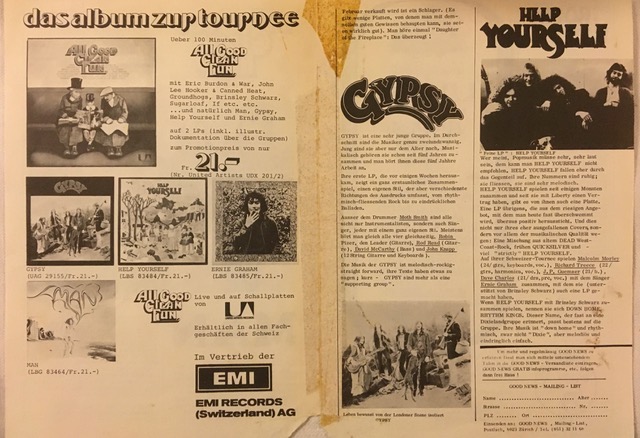
This trip was the start of a long term relationship with the guys from Man which carried on through until 1976 with many personnel changes and swaps on the way. This tour was extremely eventful, we certainly had a lot of fun, and it wasn’t all clean either. I have one standout memory from this tour and that is when we were returning home. I had now been allowed on the coach and one of the other roadies had gone with the truck. We stopped at a service station for a toilet and fuel break. Everyone sauntered into the shop area and grabbed some food or ciggies or whatever. I was one of the last to go back to the coach, and as I walked across the service area I passed those spinning racks that had to display sunglasses and things, noticing that they were nearly all empty. I climbed up the steps of the coach and as I looked towards the back, I could see that every single person was wearing a pair of sunglasses, some were even ladies’ styles. I absolutely killed myself laughing! Unfortunately, the service station lost a lot of stock that day!
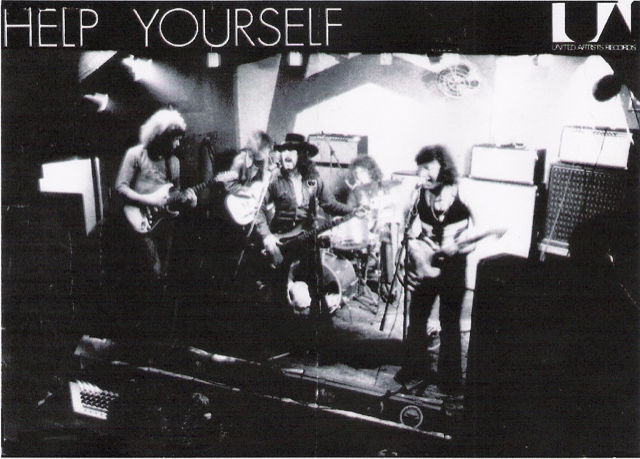
You played on his debut album and later on joined the band.
I’ve mentioned above how I got involved with Deke’s first solo album and how that resulted in the tour of Ireland. The live band was Deke, Brian Breeze on guitar, myself on bass, and Keith Hodge on drums. Keith had been playing in Suzi Quatro’s band and they had just released ‘Can the Can’. Deke talked him into leaving and joining us just before Suzi had a number one record. He must have been pretty pissed about that.
We had a good tour, much of the time supporting Thin Lizzy who were also starting to do very well with a record in the charts. We played all over the Republic and a couple of gigs in the north. It was the period of the troubles in Ireland and it was very strange and scary to see the heavy army presence everywhere. However, the band was very well received, maybe it’s because they were all Welsh except me!
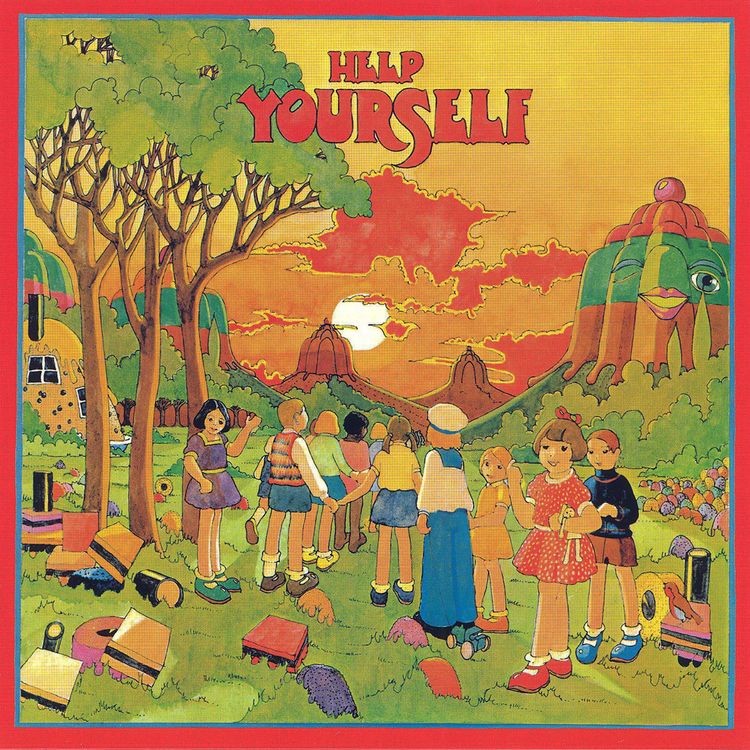
On our return Deke took me aside and said, “Sorry but I’m gonna have to let you go”. I was quite shocked and asked why, what was wrong with my playing. He said that his manager Barry Marshall thought I was too up front and taking the focus off Deke. I thought he was joking but clearly he wasn’t. The truth of the matter was that Martin Ace had just quit Man and became available and he was Deke’s preferred bass player. So now I am without a job!
Then you worked for Manticore Records and took care of their rehearsal studio.
Someone in Barry Marshall’s office, I think it was, mentioned to me that Emerson, Lake & Palmer had a rehearsal studio in an old cinema on Fulham Broadway, and their record company Manticore was looking for someone to manage it for them. So, I phoned them up and asked about the job. They said come in and we’ll talk about it. I was interviewed by their accountant and as it seemed I had my head screwed on financially they offered me the position. The cinema had a huge stage with parachute silks hanging from gantries above it as sound deadening, and it could be rented out for £40 a day. ELP used it a lot of the time, but when they weren’t it would be rented out to other bands for rehearsing tours and things. We had David Bowie, Paul McCartney and Wings, Elton John and many others all very keen to use it as there were very few venues that could accommodate a full stage show that was reasonably private. We had pretty good security on the entrances, and trucks could load and unload straight onto the stage area. I ran it for about a year assisted by a young American singer called Steve Hayes who was also in a band called Hustler.
You were also tour manager for Baker Gurvitz Army. What was Ginger Baker like back then?
I broke up with my then girlfriend who I was living in Barnes with and moved in with a girl I’d met in Walthamstow East London. This brought me back in touch with my old assistant road manager Lee Hayes who was now looking after Ginger Baker’s drums in a band he’d formed with the brothers Paul and Adrian Gurvitz. We’d known the brothers from earlier on as they lived near us in Ilford and they’d had a hit record some years earlier with ‘Race with the Devil’.
I’d also met Ginger Baker before though I doubt if he would have remembered the occasion. Whilst with Sam Apple Pie we used to go to the Speakeasy, a club in Margaret Street, in the West End, which was open nearly all night and was a favourite haunt of all the bands. You could go and have a meal and drink and whatever else till the early hours. One night I’d obviously overindulged and started to feel very woozy. I got up from the table we were sitting at and promptly passed out in a heap on the floor. Ginger had been sitting at the table next to us so I must have fallen almost at his feet. He kindly hauled me to my feet, asked me if I was ok and said, “I’d go outside and get some fresh air if I were you”. Good advice Mr Baker!
They were looking for a road manager to take with them on a tour of America that was coming up. So they took me on. The band were rehearsing and recording an album at the The Who’s Rampart studios in Battersea so we spent most of our time there or in rehearsal studios. Ginger was quite a character and still an excellent drummer. He was difficult to get to know and I kept pretty much in the background. Just before Christmas 1974 I decided to get married and needed to provide an address for the marriage licence. Adrian Gurvitz said I could use his address in Hempstead near Saffron Walden. So, we got married in Saffron Walden and after the wedding he invited my wife and I over to his house for a sort of party. Ginger was there and kept addressing my wife as Mrs Paul as he didn’t have a clue what my surname was!! I started to think about going to America, I’d never been before and also as a newlywed I started to wonder how things would work out. I was getting cold feet. The matter was taken out of my hands after Christmas though as at the next band rehearsal, Ginger took me aside and said he didn’t think I was up to the job as I had no previous experience et cetera, so he fired me! I guess I’d been a useful stop-gap whilst they were preparing for the tour.
What followed?
I got a job as a minicab driver with a company that worked for all the film and music companies in London. They didn’t mind having a long haired ex musician driving for them. I moved in with my wife and her mother and tried to earn a living but it was pretty tough once I’d paid for fuel and the rent on the car and radio et cetera you had to be “in” with the controllers to get the good jobs and that took time.
I did some bar work at the Hope & Anchor pub in Islington which was at the start of the Pub Rock period. John Eichler was managing the pub so he helped me out with shifts whenever he could. I also worked as a bouncer there stopping drugs from getting in the door.
I realised I would have to get a straight job, so signed on with a City Employment Agency and landed a job as a chauffeur for a light bulb manufacturing company, driving their young MD around in a brand new Jaguar. Later, he moved me into their export offices as he thought I could be useful there. To cut a long story very short, he later bought a small electronics company and installed me as general manager. I did quite well and eventually with the support of a Swiss manufacturer bought the company out and set it up as their UK subsidiary. I ran it successfully up until the late 1990s. My first marriage had ended in divorce but I met a special lady in 1997 who became my second wife in 1999. I took a redundancy package from the Swiss company soon after and semi-retired to Plymouth in Devon. However, I was approached by an old business colleague in 2001 and he talked me into working for him at his company in Redhill, Surrey. I worked there until he sold the company in late 2007, but then suffered some health problems so took early retirement. In 2009 we bought a motorhome and travelled all over Europe for most of the year and finally came back to Devon where I’ve lived quietly ever since, enjoying life with my wife, who is an author of several books and magazine articles, specialising in short stories with a twist, and our adopted ex racing greyhound Cherry. I still have a number of guitars but sold my bass a long time ago. I still play but only for my own amusement.
Looking back, what was the highlight of your time in the band? Which songs are you most proud of? Where and when was your most memorable gig?
Without doubt living at Headley Grange and the involvement in the first three Help Yourself albums. It was a magical time and I wished I remembered more than I do. You know what they say though, “If you remember the 60s and 70s then you weren’t there”. So true!
The songs I’m most proud of? Well as mentioned before, ‘Reaffirmation’ – because I contributed much of the basis of the song – and ‘American Mother’ because it just rocks. I also have a soft spot for ‘Just Passing Through’ from which the title of the new 6 CD set was taken, as it reminds me of how life is. It’s hard to believe that this was all fifty years or more ago now! Oh, and ‘Heaven Row’ because it is sooo funky with Madeline Bell and Doris Troy singing the backing vocals.
My most memorable gig is a toss up between The Roundhouse Zig-Zag concert and the Empire Pool Wembley where we played in front of 12,000 people. It’s the closest I got to being a rockstar!
Is there still any unreleased material from bands you were part of?
No, I think with the new 6 CD set everything that’s been recorded has now been released. There are a few unauthorised recordings floating around on YouTube and the like but they’re of generally poor quality and I don’t think are representative of the music we made.
Thank you for taking your time. Last word is yours.
Thank you Klemen for giving me an opportunity to talk about the past. Thank you to all those fans who followed Help Yourself, and those who still do. I realise now that we were a lot more popular than we thought at the time. The one thing I always wanted was to be able to look back on my life and think that I had made an impact or changed or influenced people’s lives in some way. From what I now know that is certainly the case and I’m humbled by that knowledge.
Klemen Breznikar
Help Yourself Facebook
All photo materials are copyrighted by their respective copyright owners, and are subject to use for INFORMATIONAL PURPOSES ONLY!

